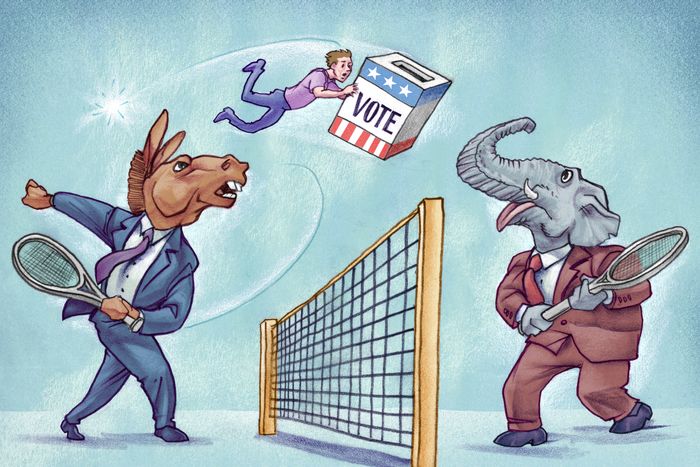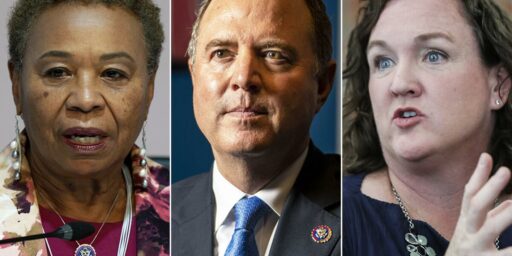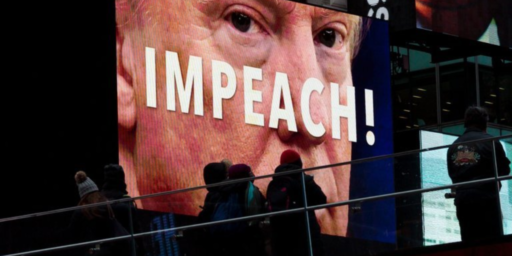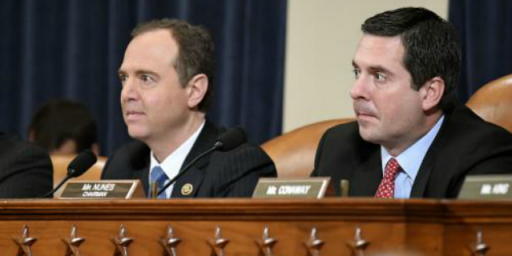Fixing the Schiff-Garvey Problem
The mess in California hides a more pressing issue.

Two articles in local papers flagged by YahooNews cast more light on last Tuesday’s primary in California.
Ranked choice voting advocates Marcela Miranda-Caballero and David Daley take to the LA Times to argue that “Steve Garvey’s strange win is a loss for California election reform.” You’ll never guess their solution.
The Dodgers don’t usually get any intentional help from their archrivals, the Giants. But something that strange just happened in California’s primary: Former Dodgers great and current Republican U.S. Senate candidate Steve Garvey advanced to the general election along with Democratic Rep. Adam B. Schiff — after being elevated almost entirely by the other team. The former National League MVP’s long-shot bid for the Senate benefited from an estimated $35 million in television ads from a surprising source: Schiff and his allies.
Why did the Burbank Democrat spend a small fortune boosting Garvey’s name recognition and blanketing the airwaves with ads that touted the former first baseman’s conservative credentials? You might call it a squeeze play: Schiff wanted to keep his two closest Democratic competitors out of the fall race, and he succeeded. Garvey claimed the second-highest vote total in the top-two primary, while Democratic Reps. Katie Porter of Irvine and Barbara Lee of Oakland finished in third and fourth, leaving them out of the running.
This is a classic example of a problem that could be solved by ranked-choice voting, a tested, nonpartisan reform that discourages this sort of gamesmanship and more accurately represents what a majority of voters want.
While I generally dislike the “jungle primary” system used by California, decry candidates or parties spending money to advance weak candidates, and support ranked choice voting, it’s not at all clear how it would solve this particular problem. Schiff would still have benefitted from boosting a weaker candidate who wouldn’t be the second choice of enough Californians to defeat him. Indeed, one imagines Garvey voters would prefer Schiff to Porter or Lee, so RCV might actually enhance the incentives for gamesmanship.
Miranda-Caballero and Daley offer a twist on a pure RCV model:
One option is for California to adopt a “final four” model such as the one being used successfully in Alaska. Instead of advancing just two candidates from the primary, the state admits the top four to the general election, which is then decided by ranked choice.
This allows multiple candidates of different ideological stripes within a party to run against one another without splitting the field, which is particularly important in an overwhelmingly blue state like California. It also helps ensure that both major parties have at least one candidate in the general election. That could have allowed Schiff, Garvey, Lee and Porter to all make their cases before a much larger and more representative November electorate.
Aside from narrowing the race to fewer candidates early, I’m not sure why you’d combine instant-runoff voting with a runoff. Aside from forcing people to show up twice in a system that has a built-in runoff and creating significant added expense, it allows the most motivated voters to weigh in first. Regardless, I don’t see how this model solves the Garvey problem, either.
Longtime California journalist Jim Newton takes to the Palm Springs Desert Sun to argue “California Republicans have been reduced to a foil for Democrats. That’s not good for anyone.”
The Republican Party established the citizens initiative, referendum and recall in California. It championed tax increases, gun control and expanded abortion rights. Earl Warren, a former state party chair and chief justice of the United States, looked forward to welcoming 10,000 new immigrants every Monday when he served as governor.
The GOP now has a new role in the nation’s biggest state: a foil for Democrats.
That’s not good news for California. It’s not even good news for Democrats, whose one-party rule grows ever more calcified and arrogant in the absence of meaningful debate. But it’s where we are.
Warren has been dead for half a century and was last elected governor almost three-quarters of a century ago, so I’m not sure the example is overly salient. But it sets up a larger point.
After a few paragraphs rehashing the Senate race and one for LA District Attorney, Newton continues,
One-party rule narrows debate and alternatives. Whatever you think of Garvey, it’s discouraging that the ideas California Republicans once espoused now can be easily ignored by ruling Democrats.
This is the state that gave us Warren, Richard Nixon and Ronald Reagan, Republicans who once connected with California priorities. They saw the value of environmental protection – as president, Nixon created the EPA – and celebrated the contributions of immigrants.
Those with long memories or access to history books will recall that conservatives in California once welcomed migrant labor, while César Chávez was among those advocating for tighter border controls, since those immigrants competed for jobs with members of his union.
Warren built roads and universities and was willing to raise taxes to invest in the state’s future. He championed universal health care and liked to say that his job required him to provide for 10,000 new Californians every week. He was elected three times – once, in 1946, as the nominee of both the Republican and Democratic parties.
As for Reagan, the icon of modern conservatism, he raised taxes, supported gun control and expanded abortion rights as California’s governor.
But the Republican Party has slipped away from that history and positioned itself increasingly out of step with most Californians. This is a state that prizes its environment – a state office building bears the slogan “Bring me men to match my mountains” – values individual autonomy and hence abortion rights, and has a long history and relationship with Latin America.
Again, Newton’s examples are ancient history. Reagan’s second term as California governor ended in 1975 which, again, is almost half a century ago. It was a different Republican Party and, indeed, a different California.
But one needn’t go back quite that far to when the GOP was not only competitive but actually dominant in California. Republicans won the state’s electoral votes in every election from 1952 to 1988 save the disastrous 1964 contest. Republicans won the governorship in 1982, 1986, 1990, 1994, 2002, and 2006.
While my preference would be that Republicans chose their own nominee for the general election, the real problem isn’t that Democrats can use the jungle primary to manipulate the November matchup but that the party is so anathema to California voters that boosting Garvey comes with little downside risk.
Modest systemic reforms could help make our elections more representative of the wishes of the people. But a sane GOP that didn’t have to write off California would fix a lot of problems. How the hell we get there, I haven’t the foggiest.





While technically true, this is egregiously misleading on two counts. First, it assumes that there is some fundamental difference between candidates based on the philosophy of the parties they belong to. Large parties don’t have philosophies, they have tactical coalitions. One need only look at the 2020 Republicans, who tossed their platform in the trash at their candidates whim. Anyone can run as a Democrat or a Republican. There is no philosophy they need to hold.
And secondly, it seems to me that one party cities and states offer more variety in candidates and more choice to the voters. Elections take place at the primary level, and there are usually more candidates with a chance of winning than when it is limited to the two candidates in the general.
RCV would be, in my view, better than Top Two. But the dynamic is going to be very similar in result depending on the district (in this case, the whole state) wherein the contest is taking place.
RCV is not, however, the miracle cure many seem to think it is. Rather, I think RCV is just a reform that is semi-doable and that people understand so it is touted as being more powerful than it actually is.
(I would note that RCV in multi-seat districts, also known as STV would be potentially transformative, but that is because of the multi-seat district part, not as much the RCV part).
You can’t write-off the highly educated and then expect to compete in California. Republicans idolize Big Men who go crazy. The ones who idolize this are not the ones who are directly under the Big Men or who exist at a coequal level close by. They are Little Men far far away in places with little social capital, who are told about Republican Big Men by other non-crazy Big Men whose job it is to show all sides. This is great for business, but what people in places with many Big Men and many ways to exist coequally want is normal stuff, and not crazy and not the resentments of Little Men.
Jim Newton’s examples of the recall initiative and referendum; and Warren, Nixon, and Reagan are not universally admired, Warren being regarded as a traitor by Republicans. James is right to see this as more a tale of the collapse of Republicans as a serious party than anything to do with electoral mechanics.
A sane GOP would, indeed, fix a lot of problems. As to how the hell we got here, my take is it mostly goes back to 1964 and IIRC Rick Perlstein’s observation that Goldwater’s campaign was the first to explicitly decide it could sell unpopular ideas with money and modern advertising techniques. That, and Kennedy’s subsequent cut to the top marginal income tax rate, freeing up a lot of money for ratfracking.
I happened to turn from here to LGM, where Paul Campos begins his post with,
Difficult. But necessary. Bad as Trump is, it ain’t just Trump, and the seeds of this go back a long way.
@Steven L. Taylor: I mostly see RCV solving three problems:
1. The fact that a plurality winner might not be the preference of the majority.
2. The (related) fact that a vote for a 3rd party candidate is now a wasted vote. RCV would allow voting for a Ralph Nader, Robert Kennedy Jr, Evan McMullin, or whomever and still have your secondary and tertiary preferences count.
3. Eliminating the need for a run-off in races that require a majority. Aside from being expensive, they’re often decided by a smaller subset of voters willing to show up a second (or third) time. And, in some cases, they attract gobs of outside money.
But, no, it’s not going to magically create ideal candidates.
The more egregious example of opponent picking in CA politics is the case of Gray Davis in 2002, which I described previously here. That didn’t involve Top Two at all. I reject out of hand the idea that the current voting system is responsible, or that we should try to “fix” it.
I also reject the idea that nobody had heard of Steve Garvey. “Boosting name recognition” my wounded knee. They might not have known he was running for senator, but that’s about it.
I just went down a bit of a rabbit hole reading articles about places in the US that use RCV and I’m not surprised but I am disappointed that none focus any attention on whether it produces better governance. Human beings are so wired to see politics as team sports that we usually forget to pretend we care about what government is actually for.
@MarkedMan: I’m not sure how we’d operationalize “better governance” or that we have enough data from US cases to even judge that. I’d be happy for more representative government.
I guess I don’t see what the problem is. Yeah what Schiff did is kind of douchey, but what do you expect?
What alternative outcome do people actually want?
A standard primary system would probably be the same result. In an RCV contest what’s the argument that anyone but Schiff would win?
I would prefer a system that is not mentioned- where governments stop subsidizing intra-party candidate selection via primaries.
As for the state of the GoP, in CA, it takes two to tango. You can’t complain about the dominance of Democrats if you’re not willing to seriously compete. And you have to compete with the electorate you have, not the one you wish for, which is anathema in our current era of strong partisanship and weak parties.
I live in one of the few red areas of Colorado and it’s a bit of the opposite problem. A lot of offices the Democrats just don’t bother trying at all, which is really frustrating.
File this under “Democracy is the worse form of government, except for all the others.” There is no perfect system for choosing leaders and Cali’s, flawed, jungle primary is an improvement closed party primaries.
The real problem is Cali is that R’s are such an out of touch party.
@James Joyner:
Given that the ideal candidate for roughly 45% of the electorate is …
…Donald J Trump, the whole question of what constitutes an “ideal” candidate is up for grabs. And I mean that in the worst way possible. But, as Paul Campos and gVOR10 noted, the problem predates Trump to when I was a junior high school student (even before middle school concept took over, then). Probably even earlier, given Buckley and the National Review.
@MarkedMan: You want better governance? Get better candidates and better voters. How you run the election has a place, too, but I’m inclined to think that governance is like computers and software mostly–garbage in, garbage out.
@Andy:
You say this, but then you point out the bigger problem.
I don’t understand why California Republicans are content with losing, and haven’t gone the route of NYC Republicans who have succeeded in getting the mayorship several times by running people who are at least outwardly more moderate. (I hold that Giuliani was always a freak, but outwardly seemed more reasonable, and tended to govern in the realm of what was possible)
You would expect some feedback from perpetually losing. Sure, I get that the primary voters are the most committed and the most extreme, but don’t they get tired of losing and being completely shut out? Are there no wealthy billionaires who fear Democratic supermajorities enough? Why does no one else get in?
California is where I would expect No Labels nonsense to have a chance to be more successful.
Rural Democrats are a similar case, although in Colorado the party is frequently competitive at the state level so they aren’t shut out of the system entirely.
@Just nutha ignint cracker:
I think you are dead on. Too many people who say they want cleaner water or better healthcare or well maintained roads spend way too much time worrying about whether the guy from their team gets elected. I’m not saying that isn’t important but it’s not the only important thing. Want better candidates, by which I assume you mean candidates willing and able to move on the issues you deem important? Then work to make those issues important in and of themselves, making the parties compete on producing results. You want better voters? Then fight for better schools and support local media.
We are in the middle of spending an unimaginable amount on infrastructure, with a good chunk of it directed towards moving us away from fossil fuels. Yet 99 times out a hundred if there is a mention of it in the media it is only about how it affects “perceptions” of each party.
@MarkedMan: I’m going to use myself as an example of the problem. I personally have no idea which projects in my State are Build-Back-Better projects. I was happy that the administration got the bill passed, and curious as to what would actually come of it, but haven’t really seen much since and haven’t dug into it myself. The Biden Administration “won”, but did the public? I assume we did, but never made the effort to follow up, at least until now. But there isn’t a lot out there. I found this, and when I look up Maryland I’m told:
Great, but which of the projects around me are using the funds from the Democrats signature achievement? You can get a list of your state’s projects from here (there’s a “Data” link on the right hand side), but there isn’t much detail.
So I reached out to our local paper’s investigations editor and suggested they do a piece on this. Hopefully it will gain some traction.
@Gustopher:
Democrats have ceded many rural areas to Republicans and the result is the rise of greaseballs like Lauren Boebert in Colorado, and Marj in Georgia. It doesn’t necessarily get better
@MarkedMan:
There are a bunch of things that I classify as thing people want to want as opposed to want to have. Clean water (in my community), better health care (for me and my family), well maintained roads (in my neighborhood), school reform (that takes care of those trouble-making other kids). The list is probably endless. And the problem with getting them–for everybody, I think–is the limits that the comments in parentheses provide. Of course, the fact that we only care about getting them for ourselves (tax reform is another) probably explains why “wanting to want” them is enough.
ETA:
AsBeing a believer in Reynold’s “imaginary sky daddy”–with all of the ramifications that belief embraces–makes me skeptical about whether better schools and better local media==better voters, but to each their own. And good luck!@Andy: further to this – it rather seems that Joyner et al are all rather making a rather strong assumption -without any particular data – that Mr Schiff actually in the mere mentioning (as far as I can tell from reading “boosting” involved merely the mention of a conservative candidate) was of real material impact (while additionally that a negative mentioning itself counts as boosting).
That is a rather aggressive assumptions on what appears to be no proper statistical basis – merely journalistic narratives
@MarkedMan: You appear to define better governance as “outcomes you like” from your own partisan political preferences, which is not much more than a heavy intellectualising façade over My Tribe versus Other Tribe.
@Just nutha ignint cracker:
When I was in 7th grade (’72), Wallace buttons were a big thing with a subset of the football team. This was in a very liberal area. And the guys who wore those buttons all those years ago? They love Trump.
@Jay L Gischer:
When I was a teenager/young man, Garvey was famous. His all-American image, pretty wife, and starring on the media-saturated LA Dodgers gained him attention beyond baseball.
Of course later on we found out how he treated his wife. And his kids. And his next wife…
@al Ameda:
Howard Dean had it right – don’t ceed anything. We should have listened to him.
@Lounsbury: It’s impossible to know what would have happened absent Schiff’s intervention. But he and his backers spent some $36 million seeking to get Garvey to finish ahead of Porter. I presume they did so for a reason.
@James Joyner: These are all reasons why I think that RCV is better (just only marginally in the given situation–and certainly as it pertains to the articles you quoted).
@anjin-san:
I’ve never paid any attention to sports stars lives–on or off the field–so, for me, no, I didn’t find out any of this. Then again, I wouldn’t be likely to vote for him either. The only sports star that ever convinced me that he had an idea worth considering was Kemp–and only until I saw the idea in action. 🙁
The Californian system is nuts. Let each party select its candidate in a closed process limited to its own members. Presumably Schiff and Garvey would still have been the candidates, but without the need for Schiff to waste money boosting Garvey and the ensuing bad blood between him and Porter. Disaffected Californians would be free to contest the election as independents, Libertarians or whatever.
@James Joyner: People spend millions on all kinds of worthless actions, as like health supplements, astrology etc. The mere act of spending does not in itself tell me anything.
Further to that, as I say again, as far as I have read – and I highlight thusly a signficant chance of having missed something – the “boosting” of the opponent occured via negative side mention in adverts on the lines of “someone in this race is too conservative for California”
As far as I can tell this “boosting” came in the form of a specific negative contrast relative to Schiff targetted voters and was perhaps at best drawing attention to his existence.
If that fact set is true, the a priori assumption that this effort is (a) “boosting” in some meaningful manner and (b) is something to wring your hands over is extraordinarily precious.
@Ken_L: Ah yes that’s shown itself to be quite the wonderful system nationally…. Oh no, that has not at all, it’s ended up producing more and more extreme results for the reasons Pr Taylor has ably and more than adequately laid out.
Never mind Schiff hardly wasted any money (regardless of what form he spent, although negative compare and contrast adverts as something to whinge on about is a level of special pleading rather extraordinary – but then one rather has the sense that no one quite actually knows the form in a factual sense but are opining based on 2nd hand reading of opinion and complaints)
I would only add here that Republicans are grown adults with agency. They have the option to adopt more serious policy choices and elect responsible politicians – but time and again they choose clowns like Jim Jordan and Donald Trump and Tommy Tuberville.
The “Jungle Primary” would not be an issue at all if better candidates were available on both sides of the aisle. The fact that the best three candidates for California Senate were all Democrats is not an indictment of our primary process.